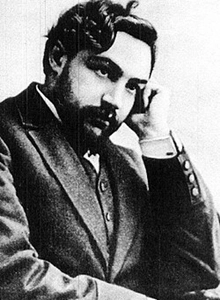
Alchevskyi Ivan Oleksiyovych (December 27, 1876, Kharkiv, Russian Empire - May 10, 1917, Baku, Azerbaijan) - Ukrainian singer (lyric tenor), public figure; organizer, head of the Ukrainian literary and artistic society "Kobzar" (Moscow).
Biography
He was the fourth child in the family of Kharkiv banker and industrialist Oleksiy Alchevskyi and public figure, founder of Sunday schools for adults Khrystyna Alchevskyi. Brother of Grigoriy and Christi Alchevsky.
Graduated from the natural science department of the Physics and Mathematics Faculty of Kharkiv University in 1901. The time Ivan graduated from the university coincided with the tragic death of his father.
Musical activity
Ivan Alchevskyi in stage costume
He studied singing with his older brother Grigory, then in Paris and Brussels. He improved his vocal and stage skills under the guidance of O. Palechek in St. Petersburg, A. Panayeva-Kartseva, in Paris with J. Reschke, took private singing lessons from the singer Felia Lytvyn. Performed on the stages of Russian and many foreign opera houses in the following cities: Petersburg (1901–1905), Brussels (1905–1906), London (1906), New York (1906–1907), Moscow (1907–1908, 1910–1912) , Paris (1908–1910, 1912–1914). 1915–1917 alternately performed on the stages of the Mariinsky Opera and the Bolshoi Theater. Toured Ukraine (Kyiv, Odesa, Kharkiv).
A singer of a wide creative range. He had about 50 opera parts in his repertoire, including Andrei in Semyon Gulak-Artemovsky's Zaporozhets over the Danube, Peter in Mykola Lysenko's Natalka Poltavka, Hermann in Pyotr Tchaikovsky's The Queen of Spades, José in Georges Bizet's Carmen , Faust in Charles Gounod's opera of the same name and many others.
Best parts: Jose ("Carmen"), Raoul ("Huguenots"), John of Leyden ("The Prophet"), Radames ("Aida"), Samson ("Samson and Delilah"), Lohengrin, Siegfried ("Death of the Gods", "Tangouser"), Don Juan ("The Stone Guest"). Other parties include Sobinin ("Life for the Tsar"), Bayan "Ruslan and Lyudmila", Synodal ("The Demon"), Sadko ("Sadko"), Zvizdar ("The Golden Cockerel"), Mykhailo Khmara "Pskovytyanka"), Karl VII ("Saratsyn"), Peter ("Natalka Poltavka"), Andriy ("Zaporozhets za Danube"); Admetus, Rinaldo ("Alcesta"), Faust ("Mephistopheles"), Romeo ("Romeo and Juliet"), Max ("The Freeman"), Herzog ("Rigoletto"), Alfred ("La Traviata"), Canio (" Clowns"), Eleazar ("The Jewess").
Famous partners: F. Shalyapin, A. Nezhdanova, N. Zabila-Vrubel, V. Kastorskyi, V. Kuza, M. Mykhailova, B. Petrov, K. Serebryakov, N. Fridu, M. Battistini, conductors — F. Blumenfeld , E. Cooper, M. Malko, E. Napravnyk, A. Nikish, N. Fedorov.
I. Alchevskyi was respected by such famous composers as K. Saint-Saëns and R. Leoncavallo.
In his concert performances, he widely promoted Ukrainian folk songs, works to the words of T. Shevchenko, among them solo songs "Fires are burning, music is playing", "I wide valley", "The thresholds are beating", "What is difficult for me" and others.
In Moscow, he organized the dramatic society "Kobzar", which united people from Ukraine and popularized Ukrainian art in Russia. He was its chairman in 1910–1912.
Died of meningitis in Baku during a tour in the Caucasus, buried in Kharkiv, at the Diocesan Cemetery. The Kharkiv newspaper[8] "Native Word" wrote about the singer's funeral. The singer's burial is now at the 13th Kharkiv cemetery.
Since 1999, it has become a tradition in Kharkiv to host the Ivan Alchevskyi International Vocalist Competition.

